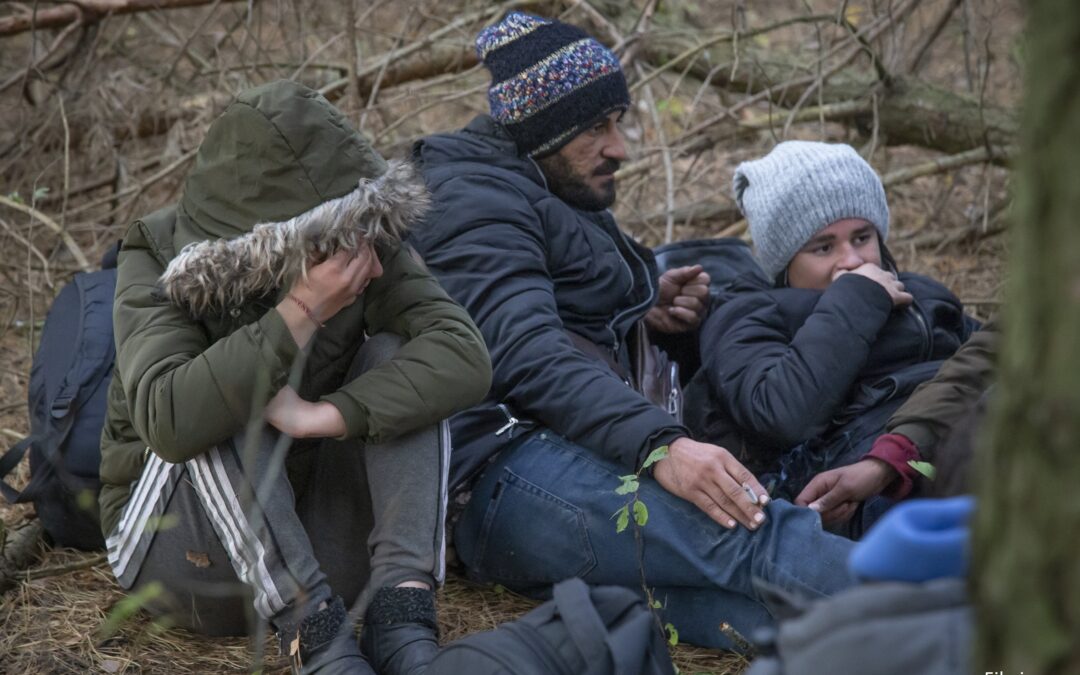A pair of activists helping migrants at the border with Belarus – where thousands of people from the Middle East, Asia and Africa are crossing into Poland – have been detained by Polish authorities and charged with aiding illegal border crossings, which can carry a prison sentence of up to eight years.
Police from the town of Hajnówka stopped a car on Wednesday afternoon and found that the couple were transporting two Iraqi citizens who had entered Poland illegally.
The two activists turned out to be Paweł Wrabec – a former journalist of Gazeta Wyborcza, Poland’s leading liberal daily, and Polityka, a news weekly – and his wife, Justyna Wolniewicz-Wrabec.
Aktywiści zatrzymani za pomoc uchodźcom. Pierwsza taka sytuacja na granicy polsko-białoruskiej https://t.co/cBKCHplHMF
— Węglarczyk 🇵🇱🇪🇺🇺🇸 (@bweglarczyk) October 28, 2021
“I was guided by my heart,” Wrabec told Gazeta Wyborcza shortly after his release from detention. “If a human impulse requires a decent person to break the law, then the law should be broken.”
“We absolutely cannot let these people die,” he added. “Anyone who has at least a little empathy should try to change this situation. I have terrible sorrow towards politicians who are not trying to stop this genocide.”
There has been a surge of crossings into Poland (as well as Lithuania and Latvia) since the summer, orchestrated by the Belarusian regime. Migrants are facing increasingly treacherous conditions, and at least seven have been found dead on the Polish side of the border in recent weeks.
The couple had used their car to pick up people emerging from the forest near Hajnówka, “wanting to give them a safe place”, said Paweł Kasprzak, who along with Wrabec founded activist group Obywatele RP (Citizens of Poland). “They just saved people’s lives, that’s why they went there.”
“Paweł and Justyna knew what they were getting into; they are not afraid of detainment and imprisonment,” added Kasprzak, speaking to Onet.
A lawyer, Robert Moraljan, speaking to Onet said he feared that the arrest of the couple could have a “chilling effect” on anyone else who wants to help the border crossers.
“I fear that any form of assistance to refugees can be interpreted as aiding in illegal border crossing,” said Moraljan. “People who invite [border crossers] into their home and provide them with shelter” could be charged, he warned.
The two Iraqis found in the car were aged around 20 to 30 and had no identifying documentation with them, reports wPolityce. They were taken away by border guards and their further fate is not yet known. Polish authorities often send migrants back over the border into Belarus.
Data from Poland’s border guard show that it has prevented more than 28,000 attempts to cross into Poland from Belarus this year (compared to only 120 in the whole of 2020). Over 17,000 of those came in October alone.
More than 2,000 people have also been detained after crossing into Poland, around half of them Iraqis. Authorities in Germany – which is the intended destination of many of the migrants – have recorded thousands more entries.
In response to the crisis, the Polish government has taken a number of measures, including sending 10,000 soldiers to the border, erecting a razor-wire fence (soon to be upgraded to an “impenetrable” wall), and declaring a state of emergency that bans non-resident civilians (including media and NGOs) from entering the area.
The government argues that it has a duty to protect the border, which is also the EU’s eastern frontier. But critics claim that it is ignoring the humanitarian needs of the migrants, a large proportion of whom are women and children. When people are seeking asylum, such practices can violate international law.
Opinion polling has shown that a narrow majority of Poles support the government’s response to the crisis, though a similar proportion are opposed to sending children back over the border. The German government has also thanked Poland for “protecting the EU border”.
Main image credit: Agnieszka Sadowska / Agencja Wyborcza.pl

Maria Wilczek is deputy editor of Notes from Poland. She is a regular writer for The Times, The Economist and Al Jazeera English, and has also featured in Foreign Policy, Politico Europe, The Spectator and Gazeta Wyborcza.



















